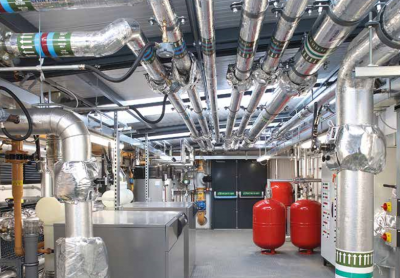Building engineering services will have to take a leaf out of the manufacturing industry's book as it strives to deliver an increasingly challenging workload. Over the next two to five years, we will see modern methods of construction starting to redefine the way we work. Building engineering contractors will have to become less and less about people working onsite and more about digital procurement and design linked to offsite manufacture.
Like product manufacturers, we will have to focus on producing more complete modules offsite. This will be partly driven by our acute skills and resource shortages, but also by a need to improve quality and compliance. Born of necessity, it will also herald a new era that will bring with it many technical, social and financial benefits - and make our industry a far more appealing career prospect for a wider cross-section of our population.
Adopting more of a production line approach will allow us to develop a less disruptive supply chain management and payment model.
Successful offsite construction depends on collaboration, which in turn will produce to a new contract model that removes old areas of conflict such as late payment. It should also ensure that the finished product works better in the long run, so addressing many of our performance and safety problems. This - along with many of the other things that make our industry so unattractive to young people - will be transformed.
Offsite construction is inherently safer, cleaner and more technologically driven and if this makes it more profitable and less adversarial, building engineering services suddenly looks like a much more appealing career. However, this is not just about medium to

'Mega projects' like HS2, Heathrow's controversial third runway and two new nuclear power stations will put an increasing strain on our pool of available skilled manpower and our departure from the EU will step up the pressure still further. Heathrow is likely to need up to 15,000 site workers and the two planned nuclear power stations at Hinkley Point and Wylfa Newydd - could each pull in more than 6,000 site-based technical staff. HS2 will absorb people from all over the country and it was recently reported that Crossrail was still recruiting M&E workers despite the nine-month delay on the project being put down to purely train-related issues.
These high profile projects have the pulling power and the budgets to attract the labour they need, but often at the expense of other employers who have their own commitments to fulfil. Engineering, infrastructure and housing projects of all shapes and sizes face the prospect of not being able to meet deadlines due to staff shortages.

In the past, the knee-jerk reaction would have been to flood projects with labour from the EU. That potentially will no longer be an option post-Brexit, but on the other hand, that could well turn out to be one of the long-term benefits of Brexit. Rather than simply bringing in people with varying levels and types of qualifications, we will have to ensure that everyone has completed the right training and has appropriate skills in line with these new working approaches.
We will still be short of people, but our lack of manpower will add fuel to the offsite revolution, which will also further improve quality. If you build something in a factory - rather than on a building site - you have a far better chance of ensuring it is finished to the right quality. You can manage the quality control process much more easily and provide better and safer working conditions for your people.
The House of Lords has spotted the importance of a big shift to offsite and modular methods of construction. Its Science and Technology Committee recently reported that offsite manufacture could improve productivity by as much as 70% while also delivering better and more energy efficient buildings.
However, designers, contractors and suppliers must all have early involvement in a project for offsite manufacture to be successful. This requires a change in business models among both private and public sector clients.
Offsite usually requires greater upfront investment than 'traditional' construction techniques, but it is better placed to deliver building lifetime benefits like energy efficiency and low maintenance costs. However, to secure these long-term gains procurers will have to wean themselves off the habit of always going for the cheapest upfront price. It is not only our clients who have to change.
The uncomfortable truth for our sector is that many of the barriers to the greater uptake of offsite manufactures, such as a lack of collaboration and attitudes to risk, are cultural and can only be dealt with by the sector itself. That is our challenge and one that we should embrace. For more information visit: www.thebesa.com









